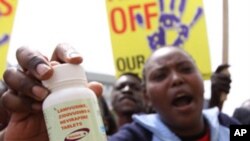AIDS activists and medical groups are worried that a trade deal expected to be struck between India and the European Union may threaten the availability of cheap generic drugs in developing countries.
The European Union and India are finalizing discussions to pave the way for one of the world's biggest free-trade agreement by early next year. The talks gathered momentum last week, during a summit in Brussels attended by Indian Prime Minister Manmohan Singh.
But among the remaining stumbling blocks is this one: fears by AIDS activists and the humanitarian group Doctors Without Borders that a trade deal might threaten the availability of cheap, Indian-manufactured drugs in developing countries.
Katy Athersach is a policy advisor for Doctors Without Borders in Geneva.
"The reason why this is so important to us is that 80 percent of the medicines we use to treat people living with HIV and AIDS across our projects in the developing world come from generic companies in India," says Athersach. "And these drugs are vastly cheaper than alternatives because of the competition that has allowed these Indian companies to compete together and lower prices."
Among other concerns, Athersach says Doctors Without Borders is worried a trade agreement will strengthen European patent protections, denying Indian companies immediate access to new drug developments. Similar concerns sparked a demonstration by AIDS activists last week in Nairobi.
Activists have also rallied in India, Thailand and London, says Athersach.
"We are very hopeful that our arguments will be heard, that our voices will be taken into account and that these provisions will be removed from the agreement. But of course this is by no means certain," she says.
European drug makers argue a lack of strong patent protections has given Indian generic companies an unfair advantage.
The European Commission appears to be trying to balance these competing interests. In an e-mailed response, spokesman John Clancy said the commission is aware of the concerns about allowing developing countries access to cheap drugs - and they are under discussion.
Pending Trade Deal Worries AIDS Activists











